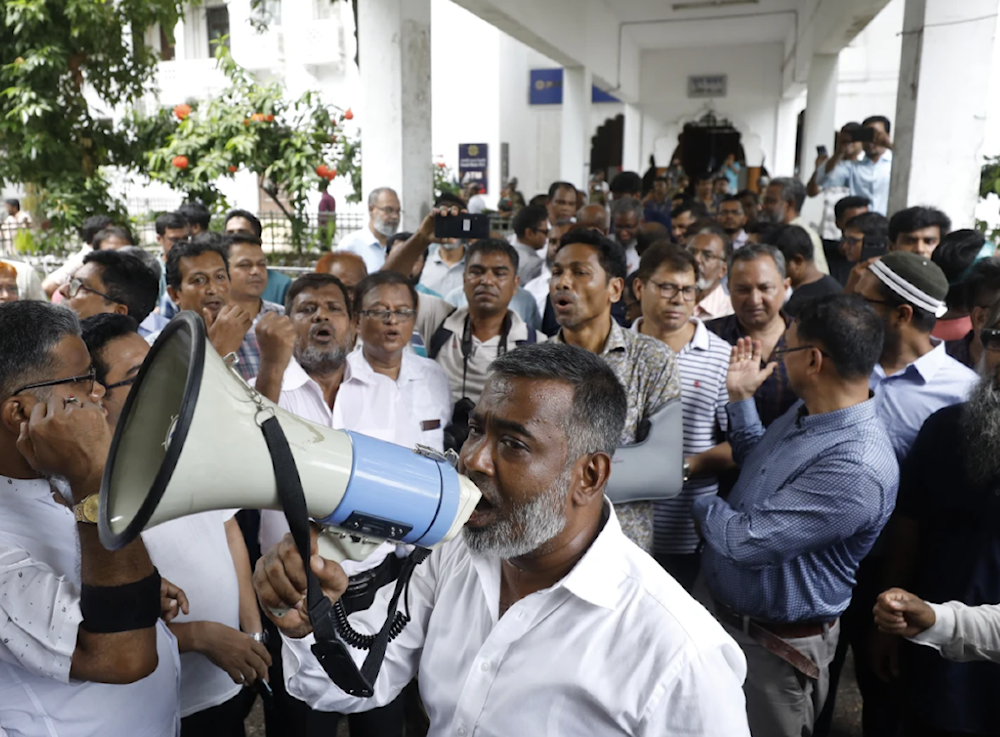Bangladeshi Chief Justice resigns after protest leader ultimatum
Five judges from the Supreme Court's Appellate Division were expected to quit with Chief Justice Hassan.
-

Lawyers protesting in the court premises demanding the resignation of Bangladesh's Chief Justice Obaidul Hassan and other senior judges in Dhaka, Bangladesh, on August 10, 2024. (AP)
Bangladeshi Chief Justice Obaidul Hassan has resigned from the Ministry of Law due to student protests, Bangladeshi media reported on Saturday.
The decision follows an ultimatum given by a protest leader seeking Hassan's resignation, according to the Dhaka Tribune newspaper. President Mohammad Shahabuddin is likely to take action following his resignation.
Five judges from the Supreme Court's Appellate Division were expected to quit along with Chief Justice Hassan.
Bangladeshi President Mohammed Shahabuddin dissolved parliament Tuesday after the resignation of Prime Minister Sheikh Hasina, who fled to a safe house outside New Delhi after fleeing the country following violent crackdowns during the student-led anti-quota protests, enabling the formation of an interim government.
Hasina resigned and left the country on Monday, Reuters reported, after thousands of protesters stormed her official residence amid ongoing violent student-led protests.
At least 356 people have been killed since July.
On Friday, Muhammad Yunus was sworn in to lead Bangladesh's interim government in a ceremony that began with a minute of silence as a tribute to those who were killed during the violent protests that recently swept the country.
Over 1,500 guests attended the inauguration led by President Mohammed Shahabuddin, including politicians, students, protest organizers, and military and civil society representatives. Other members of the interim government were also sworn in, including two student leaders and Adilur Rahman Khan, a major human rights activist who was previously imprisoned by the toppled government.
The reason behind protests
Since July 1, thousands of Bangladeshis have been protesting the reinstatement of the quota system, which was abolished in 2018 since it was deemed unlawful but was restored on June 5.
With around 18 million young people in Bangladesh unemployed, according to government data, the reintroduction of the quota scheme has deeply frustrated graduates who are already facing a severe job crisis.
Last month, the government deployed police and paramilitary forces to contain the violence, but the unrest persisted. On July 19, the government imposed a curfew and brought in the army to curb the protests.
The quota system was originally implemented by Sheikh Mujibur Rahman, the founding leader of Bangladesh and father of Prime Minister Sheikh Hasina, as a reward for fighters who fought in Bangladesh's 1971 liberation war against Pakistan. In 1997, and again in 2010, the quotas were expanded to include the descendants of freedom fighters.
Students argued that the system was unfair and called for most government jobs to be awarded based on merit.
On July 21, the Supreme Court of Bangladesh significantly reduced the number of government jobs reserved for war veterans and their descendants, in a landmark decision following violent student protests that resulted in 155 deaths.
Shah Monjurul Hoque, a lawyer representing student groups, indicated that the court ruled that only 5% of government jobs will now be reserved for the children and grandchildren of those who fought for Bangladesh's independence from Pakistan in 1971, down from the previous 30% quota for this group.

 3 Min Read
3 Min Read








